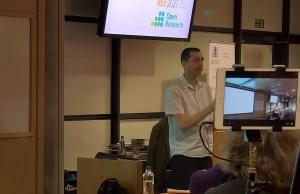 Professor Graham Law delivered his inaugural lecture on 30 January 2018 to a full audience of members of academic staff and the general public. The lecture included an outline of Graham’s academic career from posts at York and Leeds Universities to his current professorship at the University of Lincoln where he is a senior member of the Community and Health Research Unit and School of Health and Social Care. During the course of his career, Graham has published almost 100 research papers, many of which have been highly cited, including papers in the prestigious New England Journal of Medicine and American Journal of Epidemiology.
Professor Graham Law delivered his inaugural lecture on 30 January 2018 to a full audience of members of academic staff and the general public. The lecture included an outline of Graham’s academic career from posts at York and Leeds Universities to his current professorship at the University of Lincoln where he is a senior member of the Community and Health Research Unit and School of Health and Social Care. During the course of his career, Graham has published almost 100 research papers, many of which have been highly cited, including papers in the prestigious New England Journal of Medicine and American Journal of Epidemiology.
 The lecture continued with a discussion of what epidemiology is, and its origin’s with Dr John Snow’s discovery that cholera is waterborne, through his removal of the water pump handle at Broad Street in the Soho area of London which halted the epidemic. Graham spoke about his groundbreaking work on functional data analysis which involves complex analysis of large longitudinal data over time. This has included studies on a huge range of topics including the epidemiology of diabetes, sleep, gastrointestinal and a variety of other conditions. He has also supervised 10 doctoral students to completion of their PhD and has run programmes in epidemiological statistics at Leeds University, for medical and master’s students. More recently he has been investigating the relationship between poor sleep and the risk of developing diabetes.
The lecture continued with a discussion of what epidemiology is, and its origin’s with Dr John Snow’s discovery that cholera is waterborne, through his removal of the water pump handle at Broad Street in the Soho area of London which halted the epidemic. Graham spoke about his groundbreaking work on functional data analysis which involves complex analysis of large longitudinal data over time. This has included studies on a huge range of topics including the epidemiology of diabetes, sleep, gastrointestinal and a variety of other conditions. He has also supervised 10 doctoral students to completion of their PhD and has run programmes in epidemiological statistics at Leeds University, for medical and master’s students. More recently he has been investigating the relationship between poor sleep and the risk of developing diabetes.
 Another aspect of Graham’s work which was very evident during his entertaining and informative lecture was his interest in increasing the public understanding of science. He has done his through engaging in many public lectures, television, radio and popular books such as his recent publication with Dr Shane Pascoe, ‘Sleep Better: The Science and the Myths’. Graham ended by explaining why he loved Lincoln University – his new colleagues, the lack of bureacracy and the ambition of Lincoln to develop as a world-class university.
Another aspect of Graham’s work which was very evident during his entertaining and informative lecture was his interest in increasing the public understanding of science. He has done his through engaging in many public lectures, television, radio and popular books such as his recent publication with Dr Shane Pascoe, ‘Sleep Better: The Science and the Myths’. Graham ended by explaining why he loved Lincoln University – his new colleagues, the lack of bureacracy and the ambition of Lincoln to develop as a world-class university.
